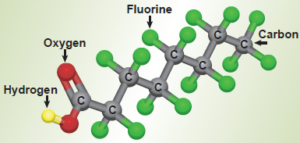
PFOA Farmland Contamination
What are PFOAs?
Water treatment plants process wastewater and stormwater entering the system and separate solid wastes (sludge) from liquid wastes through settling. While the liquid waste could be reclaimed, sludge had to be disposed of at landfills. But in the 1970s, wastewater managers began “recycling” their sludge by giving it to nearby farms to spread on their fields, a process called land application. Because the sludge had a high nitrogen content it served as a free fertilizer for farmers and helped reduce the cost of operating wastewater treatment plants. But this process had an unintended consequence: the sludge contained undetected chemicals including Persistent Bioaccumulative and Toxic Substances (PBTs) and Per- and polyfluoroalkyl substances (PFAS) to enter agricultural soils throughout the western world.
PFAS are stable, man-made chemicals that are bioaccumulative—meaning that organisms absorb the substance more rapidly than they eliminate it from their system. They are also toxic at low concentrations and easily transferred to groundwater.
European Environmental Agency 2019
Land Application
Land Application of sludge contaminates foods produced even decades after land application. For instance, Song Bird Farm is a certified organic grain and mixed vegetable farm in Unity, Maine. But in 2022, Song Bird Farm discovered that 24 years before they purchased the farm, the previous owners spread sludge. When Song Bird Farm had a soil scientist test their well water, soil, and produce, all three tested positive for PFAs. Since these tests, the farm has stopped all sales and pulled its products from the shelves.
Health Risks of PFOA Exposure
PFOAS have been associated with increased cholesterol levels, changes in liver enzymes, decreased vaccine response among children, decreased birth weight, thyroid disease, risk of high blood pressure and pre-eclampsia in pregnant women, and increased risk of kidney or testicular disease among others. But further testing is necessary to understand the full impact of these chemicals on humans.

What can we do to protect ourselves from PFOAs?
- Farmers: soil remediation plans are still in the early stages so there is no short-term solution for farmers impacted by the historical use of PFAS. But, farmers that were paid to accept sludge for land application but were not warned about the long-term public health and agricultural harm of these chemicals may have a legal claim against sludge providers. Please get in touch with us if you would like to discuss your options.
- Individuals: Well water is susceptible to runoff from nearby sources. If you own a well and believe you have contaminants in your water, consider having a certified lab test for PFAS and PFOS compounds.